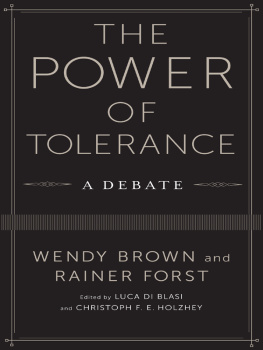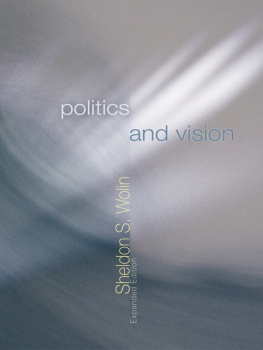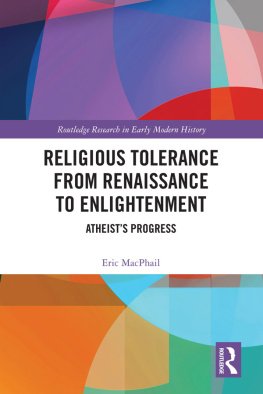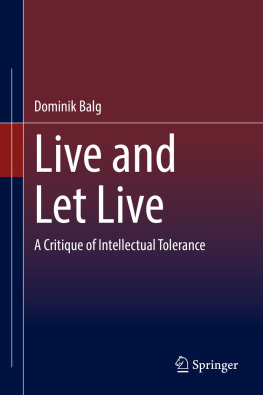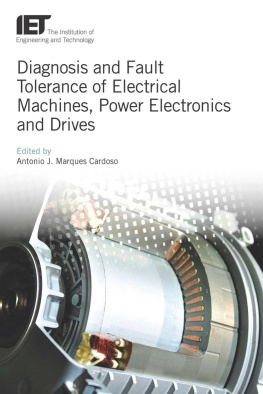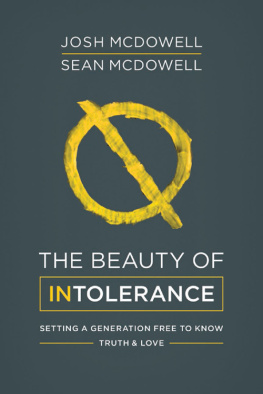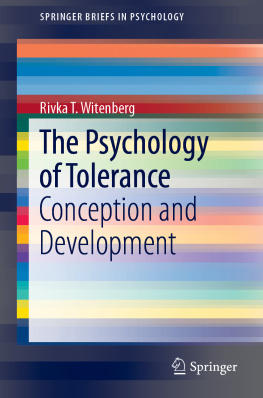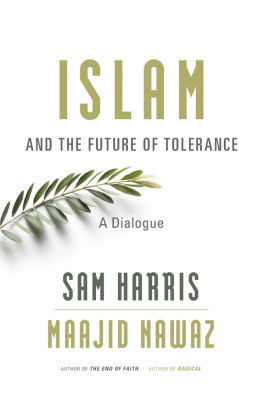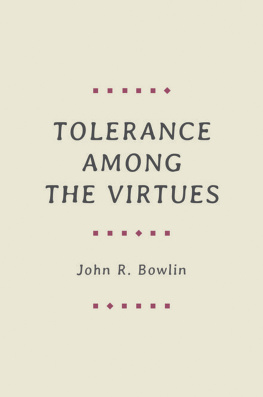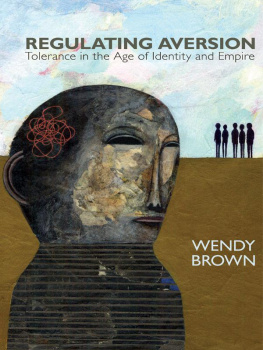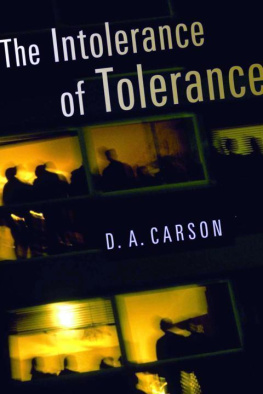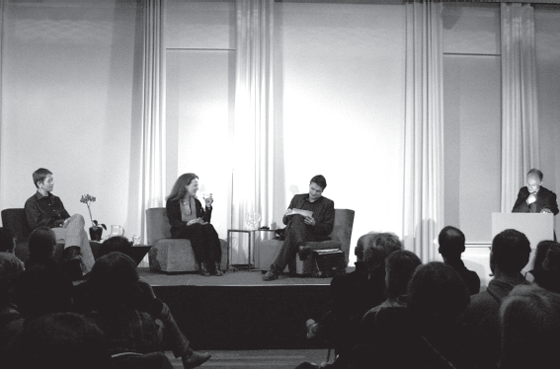THE POWER OF TOLERANCE
New Directions in Critical Theory
NEW DIRECTIONS IN CRITICAL THEORY
AMY ALLEN, GENERAL EDITOR
New Directions in Critical Theory presents outstanding classic and contemporary texts in the tradition of critical social theory, broadly construed. The series aims to renew and advance the program of critical social theory, with a particular focus on theorizing contemporary struggles around gender, race, sexuality, class, and globalization and their complex interconnections.
Narrating Evil: A Postmetaphysical Theory of Reflective Judgment, Mara Pa Lara
The Politics of Our Selves: Power, Autonomy, and Gender in Contemporary Critical Theory, Amy Allen
Democracy and the Political Unconscious, Nolle McAfee
The Force of the Example: Explorations in the Paradigm of Judgment, Alessandro Ferrara
Horrorism: Naming Contemporary Violence, Adriana Cavarero
Scales of Justice: Reimagining Political Space in a Globalizing World, Nancy Fraser
Pathologies of Reason: On the Legacy of Critical Theory, Axel Honneth
States Without Nations: Citizenship for Mortals, Jacqueline Stevens
The Racial Discourses of Life Philosophy: Ngritude, Vitalism, and Modernity, Donna V. Jones
Democracy in What State?, Giorgio Agamben, Alain Badiou, Daniel Bensad, Wendy Brown, Jean-Luc Nancy, Jacques Rancire, Kristin Ross, Slavoj iek
Politics of Culture and the Spirit of Critique: Dialogues, edited by Gabriel Rockhill and Alfredo Gomez-Muller
Mute Speech: Literature, Critical Theory, and Politics, Jacques Rancire
The Right to Justification: Elements of Constructivist Theory of Justice, Rainer Forst
The Scandal of Reason: A Critical Theory of Political Judgment, Albena Azmanova
The Wrath of Capital: Neoliberalism and Climate Change Politics, Adrian Parr
Media of Reason: A Theory of Rationality, Matthias Vogel
Social Acceleration: The Transformation of Time in Modernity, Hartmut Rosa
The Disclosure of Politics: Struggles Over the Semantics of Secularization, Mara Pa Lara
Radical Cosmopolitics: The Ethics and Politics of Democratic Universalism, James Ingram
Freedoms Right: The Social Foundations of Democratic Life, Axel Honneth
Imaginal Politics: Images Beyond Imagination and the Imaginary, Chiara Bottici
Alienation, Rahel Jaeggi
WENDY BROWN / RAINER FORST
THE POWER OF TOLERANCE
A Debate
Edited by
Luca Di Blasi and Christoph F. E. Holzhey
COLUMBIA UNIVERSITY PRESS
NEW YORK
Columbia University Press
Publishers Since 1893
New York Chichester, West Sussex
cup.columbia.edu
Copyright 2014 Luca Di Blasi and Christoph F. E. Holzhey
All rights reserved
E-ISBN 978-0-231-53796-4
Library of Congress Cataloging-in-Publication Data
Brown, Wendy, 1955
The power of tolerance : a debate / Wendy Brown and Rainer Forst; edited by Luca Di Blasi and Christoph F. E. Holzhey.
pages cm. (New directions in critical theory)
Includes bibliographical references.
ISBN 978-0-231-17018-5 (cloth : alk. paper) ISBN 978-0-231-17019-2
(pbk. : alk. paper) ISBN 978-0-231-53796-4 (e-book)
1. Toleration. I. Forst, Rainer, 1964 II. Di Blasi, Luca. III. Holzhey, Christoph F. E., 1968 editor of compilation. IV. Title.
HM1271.B756 2014
179'.9dc23
2013050640
A Columbia University Press E-book.
CUP would be pleased to hear about your reading experience with this e-book at .
Jacket Design: Julia Kushnirsky
This work is being simultaneously published in Europe by Verlag Turia + Kant
References to websites (URLs) were accurate at the time of writing. Neither the author nor Columbia University Press is responsible for URLs that may have expired or changed since the manuscript was prepared.
CONTENTS
This volume documents the public discussion between Wendy Brown and Rainer Forst that took place on 8 December 2008 at the ICI Berlin Institute for Cultural Inquiry within the framework of the ICI series Spannungsbungen. The debate was planned and moderated by Antke Engel, and the epilogue for this publication was written by Christoph Holzhey and Luca Di Blasi in 2013.
ANTKE ENGEL: Good evening and a warm welcome to everyone. It is wonderful to have Wendy Brown and Rainer Forst as our guests of tonights Spannungsbung, and Im very enthused to see that so many of you are here, looking forward to an inspiring evening. We invited Wendy Brown, who is Emanuel Heller professor of political science at the University of California, Berkeley, and Rainer Forst, who is professor of political theory and philosophy at the Johann Wolfgang Goethe University in Frankfurt as well as co-director of the Research Cluster Formation of Normative Orders, because both have written major and very decisive books on tolerance as a political category.
Wendy Browns Regulating Aversion: Tolerance in the Age of Identity and Empire makes an argument that tolerance is among other things an instrument of liberal governance and a discourse of power that legitimizes white Western supremacy and state violence. Forst is interested in figuring out how and when tolerance turns out to be a repressive attitude or practice, and under which conditions it expresses respect and contributes to social justice.
While there are similarities between Browns and Forsts critique of tolerance as an attitude of superiority and a social practice of domination, tensions can be found in their assessment of liberal discourse and civic practices of deliberation. For both of them toleration is a discursive phenomenon that materializes in social practices and political technologies, a phenomenon that is geopolitically and culturally specific, that undergoes historical change, and as such also leads into conflicts about the concept of tolerance itself. Yet, concerning the question of how tolerance is used as a token in multicultural discourses, how it is activated in politics of justice, and whether it is a promising stepping stone towards recognition, Wendy Brown and Rainer Forst disagree. Forst argues for the norm of reciprocity in tolerance conflicts and he interprets the interactive dimension of these conflicts as resulting from contradictory convictions that call for the virtues of toleration and respect despite irresolvable differences. Brown, by contrast, stresses the continuous reproduction of the position of the other structurally inherent to the discourse of tolerance, which stabilizes unequal positions between those tolerating and those tolerated. So there is plenty of material to feed a Spannungsbung. My hope is that at the end of this evening we will have various and differing views as to whether tolerance may nevertheless function as an instrument in political fights for emancipation and justice.
Before I hand over to our speakers let me say a few words about the structure of tonights event. We will now start with short inputs by both Wendy Brown and Rainer Forst. After that they will have approximately twenty minutes time to react to their respective talks, and then I would like to open the discussion for the audience. My moderation will be guided by the overarching question as to whether you see tolerance discourses as suited for modifying existing social and societal power relations. There are three major topics that I hope will be covered in the discussion. The first one is the topic of subject constitution: How does tolerance actually constitute specific subjectivities of those tolerating and those tolerated? The second one relates to conflicts: To what extent and how can conflicts be understood as productive tensions? Thirdly, I would like us to focus on the role of the state, on tolerance as a discourse of governmentality, and the question as to what extent tolerance depoliticizes the social field. And, of course, I am curious as to which modes and topics of tension will arise during the next two hours. And with these remarks I will end my little introduction and give the floor to Wendy Brown.

